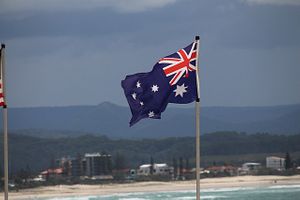The Aussie media is agog with China stories: trade, political aid, sales and refusal of sales of land or power providers, rhetoric from the Global Times, and propaganda from China Watch. Scary stuff — or so it seems. In actuality, one story is conflated with another till the effect is paranoid distortion.
The best example of this lately might be the Australian Broadcasting Corporation’s story last week on Chinese donations to Australian political parties, totaling some A$5.5 million (US$3.78 million). These businesses with supposed links to the Chinese government range from the enormous Everbright financial services company to Bon Bon Bakery. Yet cataloging the donors was not really the point. The ABC, which should certainly know better and usually does, stuffed every other China story of 2016 into the article, making for one very confusing knot.
Certainly these large donations bear looking into; though A$5.5 million is, comparatively, peanuts it does make China the biggest source of overseas donations. However, they are not really related to China’s refusal to acknowledge the July 12 arbitral ruling in favor of the Philippines’ South China Sea case, nor is the embarrassing celebration of Chairman Mao concerts in Melbourne and Sydney.
ABC’s Chris Uhlmann writes:
Australian defense and intelligence agencies are increasingly uneasy about the level of Chinese Government influence here. That concern stretches from influence-buying in politics, through investment in critical infrastructure to control over local Chinese-language newspapers, radio stations and community associations.
The refusal of the Ausgrid sale (the “investment in critical infrastructure” being referenced) has been well defended on this blog and the national security concerns seem valid given China’s track record in hacking and cybersecurity. And while Beijing is trying hard to force local Chinese media to toe the official line, and is rousing sections of the diaspora to lobby Canberra to stay out of South China Sea disputes or to protest the Hague ruling is disquieting, those too are their own issues, separate from the political donations under discussion.
Uhlmann also noted that China’s bid for influence “goes deeper still, with major English-language newspapers here effectively publishing propaganda.” He did not elaborate but is likely referring to the Fairfax Media deal with the China Daily to publish the eight page China Watch liftout each month. There has been a good amount of upset in the Australian media over this propaganda and whilst China Watch does indeed push China’s views in a kind of soft power advertorial effort (Russia Behind the Headlines does the same) it does not do it very well, nor in a way that is remotely interesting. If the Global Times last month decided Australia was a”‘paper cat” (unworthy of being called tiger) then China Watch is the toothless kitten of propaganda — evidence less of pernicious Chinese influence than a capitalist-sized bank balance and communist-style marketing plan.
Few nations have been as thoroughly scrutinized as a rising China. However all worries are not the same, nor equal. The real fear of Chinese cyber hacking (government sponsored or not, it has occurred in other nations like the Philippines or Vietnam) differs from February’s Rolex scandal, which again is not the same thing as a newspaper liftout or a frothing, click-baity Global Times editorial.
China, after all, is not the homogenous giant within that it can appear from without and its varied international actions are undertaken by different actors with different goals. Listing these incidents all together, categorized as moves made by “China” writ large, is misleading and ultimately self-defeating.
































